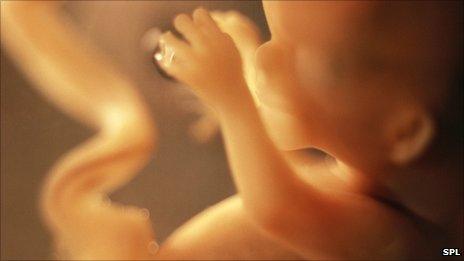Parents warned to be cautious of umbilical stem cell 'cure'
- Published

A growing number of UK parents are paying private firms thousands of pounds to store stem cells taken from their new-born baby's umbilical cord in the hope it could cure future illnesses, but experts warn they could be wasting their money.
"You think you've done everything correct. You've taken out all the insurances you think you need.
"You've ticked all the boxes and then despite all of that, a non-sterile sample has ended up meaning that it's not going to be able to be used."
San Sanghera and his partner Parmjit paid a UK-based company £1,900 ($3,000) to store stem cells taken from the blood of the umbilical cord of their young son, Rowan. Mr and Mrs Sanghera hoped that these stem cells could be used to help their son if he became ill in the future.
They were told the sample was contaminated, but were given the option for it to remain in storage, which they accepted.
But when, at the age of 10 months, their son was diagnosed with cerebral palsy, Mr and Mrs Sanghera discovered his stem cells could not be used.
"You feel you've done everything correct and it ends up being useless."
"That was a huge kick in the teeth," Mr Sanghera told the BBC's 5 live Investigates.
'Not enough evidence'
But some experts argue even perfectly clean samples are very unlikely ever to be used and are warning parents against using private companies to bank stem cells.
Last month the Royal College of Midwives and the Royal College of Obstetricians and Gynaecologists restated their concern about the practice in a joint statement:
"There is not enough evidence at present to recommend routine private cord blood collection and banking unless there is a medically-indicated reason."
It is a view echoed by the charity Leukaemia and Lymphoma Research:
"We've looked at the medical literature - and our conclusion has been that there is a very strong consensus that says it's not a rational case to be made for [the practice]," says Ken Campbell, the charity's clinical information officer.
Despite the warnings, business is booming.
According to the regulator, the Human Tissue Authority (HTA), last year UK-based labs processed more than 16,000 cord blood samples, of which 6,886 were sourced in this country.
Advocates believe stem cells stored in this way could eventually be used to alleviate numerous serious medical conditions.
Diseases like leukaemia are already treated with stem cells from public banks.
But Ken Campbell of Leukaemia and Lymphoma Research is clear to distinguish between the merits of public and private banking:
"There is no case convincingly made for storing a child's stem cells in a bank for that child's own use, or even for a sibling's use."
Mr Campbell says there is one exception which concerns families where there is already a child with a condition which may be treated with cord blood cells - but he says there would be no need to go to a private company because it could be arranged with the NHS.
Car park collection
There are also concerns that some cord blood is being collected unlawfully.
Collections should only take place on licensed premises or under a third-party agreement with a licensed establishment, such as a private blood bank.
In March 2010, the Human Tissue Authority wrote to 150 organisations to warn that unlawful collections compromised safety and quality standards.
In one case, cord blood was collected in a car park and the sample had to be disposed of because it was contaminated.
And the HTA says it is aware of at least two other occasions where parents have been given the option to remove the placenta and cord from hospital premises to carry out a collection.
The HTA told 5 live Investigates that it had taken regulatory action against 22 establishments - 21 of which were hospitals.
Even though Rowan Sanghera's stem cells could not be used to treat his cerebral palsy, his father still believes medical advancements may one day mean his money was not wasted.
"I still hold out hope that at some point in the future we may be able to find somebody clever enough, or they may have found some technique to try and clean out this bacteria they found."
But critics remain concerned that hope, rather than evidence, may be persuading parents to part with their money needlessly.
You can hear the full report on 5 live Investigates on Sunday, 9 October at 21:00 BST on BBC Radio 5 live.
You can listen again on the BBC iPlayer or by downloading the 5 live Investigates podcast.
- Published5 October 2011
- Published15 June 2011
- Published25 November 2014
- Published31 March 2011